I thought that Damian Thompson, writing for the Telegraph, did a nice job summing-up (at least in part) the legacy of Pope Benedict XVI. Here's an excerpt.
Benedict's central achievement was that he began – but came nowhere near finishing – the "purification" of the Catholic Church that was his most pressing concern. This necessitated the reform both of the liturgy and of the behaviour of the clergy entrusted with its performance. It might seem strange to yoke together the two, but Ratzinger has always emphasised that liturgy – properly orientated worship of God – is the ultimate purpose of Catholicism, requiring a holy priesthood and laity.
Benedict saw himself as continuing the mission of his predecessor, John Paul II, to restore the divine dignity of the Eucharist by renewing the celebration of Mass and encouraging adoration of the Sacrament. The extraordinary scenes in Hyde Park during his visit to Britain in 2010 testified to his success – but his reluctance to bully bishops into following his suggestions meant that the mission was not fully fulfilled. (A little example that infuriates me: the Pope encouraged priests to celebrate Mass facing a standing crucifix. He himself did so at Westminster Cathedral, but the tall cross was quickly removed after he'd gone. Why?) Benedict also restored Catholics' freedom to attend the Tridentine Mass, suppressed in the 1970s – but, again, many bishops did their "la-la-la-can't-hear-you-Holy-Father" act and Summorum Pontificum has yet to be enforced.Read the rest here.
The point about the traditional Mass, the bishops, and their 'la-la-la-can't hear-you-Holy-Father' act is, sadly, more correct than most would like to admit. Just look around. The problems go beyond the bishops and their appalling reluctance to advocate on behalf of the traditional Latin Mass and Summorum Pontificum. They have, in fact, done very little to correct the prodigious number of abuses that take place on a day-to-day basis in the Novus Ordo form of Mass.
The liturgical errors and anomalies have set in to such a ubiquitous degree, and over the course of so many decades, that the majority of the faithful are totally unaware that abuses are really abuses. For instance, do we really need four or more Extraordinary Ministers of Holy Communion at a daily Mass with only thirty people present? Of course, the answer is 'no.' The point is that most Catholics see absolutely nothing wrong with this all-too-common spectacle. Quite the contrary, it is instead celebrated and encouraged as a form of 'active participation' in liturgy. Furthermore, isn't it a little strange when a parish offers its parishioners little to no time for Confession, and yet everyone routinely receives Holy Communion, week after week, year after year, with never a mention from the pulpit about the necessity of being properly disposed to receive Communion worthily, in the state of grace?
In many churches, old confessionals have been converted into convenient storage space for appallingly kitschy church decorations gleaned from the sorry, picked over remnants of the sales rack at Jo-Ann Fabric. Tabernacles that house Our Lord have been relocated to isolated 'chapels' that, with any luck, you just might be able to find somewhere on the church's property with the help of a compass and/or GPS endowed smart phone, or an octogenarian 'Greeter' who actually knows something useful about the church. But that's not too likely.
Still, the liturgical restoration has been set in motion, and, while it may be a slow process, it won't be stopped. Interestingly, it's the young Catholics who are more of one mind on this subject with Benedict XVI than their much older diocesan bishops, still living in the 1980s. And that is cause for thanks.
Now, let's complete the circle.
















